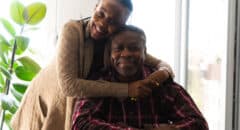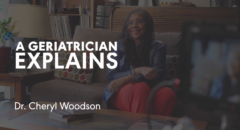 Muhammad Ali found a reward greater than any championship belt or medal, when he married Yolanda "Lonnie" Williams on November 19, 1986.
Muhammad Ali found a reward greater than any championship belt or medal, when he married Yolanda "Lonnie" Williams on November 19, 1986.
At the time, he had already been diagnosed with Parkinson’s syndrome. Later that diagnosis was changed to Parkinson’s disease, which meant Muhammad’s condition would progressively worsen as time went on. Never having met anyone with Parkinson’s disease, Lonnie felt alone. There was no one for her to talk to who was in a similar situation.
Admittedly, she’s learned a lot about caregiving throughout the years--all the way up until Ali's death. She says knowing more beforehand would have made life easier for her and her husband and is eager to help anyone caring for a loved one. Here's her 10 tips for caregivers:
SIGN UP FOR OUR NEWSLETTER HERE!
10. Educate yourself and your family. Learn all you can all aspects of your loved one’s disease. Research causes, symptoms, long term prognosis, available treatment options, and possible new treatments that become available. Arming yourself with knowledge will enable you to anticipate and prepare for changes in behavior as well as physical, mental and emotional needs.
READ: Muhammad Ali: What Really Is Parkinson's Disease?
9. Research, research, research! Use your resources to research and find the best nearby specialist. Choose a specialist specific to the disease you are managing, not a general practitioner. Specialists have specific knowledge and are aware of the latest treatment protocols available that will affect the long-term well-being of the patient.
8. Stay organized. This is crucial in order to avoid becoming overwhelmed. Keep a dedicated calendar for your loved one that can easily be taken along on doctor visits. On the calendar, be sure to note doctor and therapy appointments, start and stop dates of medicines, and noted side effects. Also keep a list of all doctors’ phone numbers and addresses in case of an emergency.
7. Ask for help. No one is able to take care of a person with a chronic illness 24 hours a day, 7 days a week. Put together a list of friends and family members whom you trust and can call upon to relieve you for a few hours or in case of an emergency. If the financial means are available, seek outside professional help for in-home assistance.
6. Prepare a list of questions for your doctor. Discuss long-term prognosis, symptoms you need to be aware of, other existing medical conditions that may affect the health of your loved one, medicine protocol, non-medical treatments and current medical research, if any, that may offer better treatment options.
5. Health Insurance. Familiarize yourself with the details of your loved one’s medical insurance. Determine what services are covered and not covered. Find out the long-term needs of your loved one and make sure his or her current medical plan will meet those needs.
4. Build a support group. This can include friends, family, medical personnel and spiritual advisors. Most communities have organized support groups for specific diseases that will enable you to connect with other caregivers. If your time is limited, take advantage of online communities that will allow you to connect with others who share similar caregiving issues and challenges.
3. Know your rights and your loved one’s rights. This will be helpful as your caregiving duties move from care partner to caregiver and short-term to long-term. Whether it’s a disability, family leave, or elder rights, become knowledgeable so you are empowered to speak up for you and your loved one.
2. Focus on quality of life. Caregiving can be very trying at times so be sure to keep a positive attitude and sense of humor. Plan some activities for both of you to participate in together. This allows for you to connect with each other outside of the caregiving role.
1. Take care of yourself. Caring for yourself is as important, if not more so, than caring for your loved one. Eat healthy, get plenty of rest, and make it a point to exercise. But most importantly, don’t stop living! Although your life has changed, you still have one. Preserving as much of your life as it was before the diagnosis will enhance the overall quality of life for you and your loved one.
For more info on how to make Caregiver's lives easier, click here.








